GED Math Study guide: 11 Steps to pass the GED Test in 2026!
Pass the GED Math test using this step-by-step GED study guide. If you’re looking for GED Math help to pass the GED Mathematical Reasoning test, then look no further! We provided an 11 steps study guideline for GED test-takers.
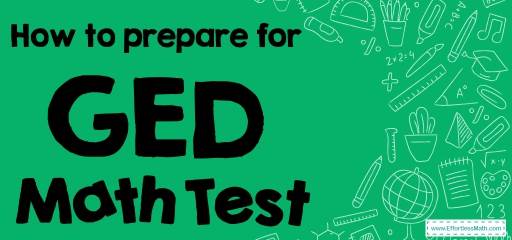
The General Educational Development Test, commonly known as the GED or high school equivalency degree, is a standardized test and is the only high school equivalency test recognized in all 50 USA states. GED test is for those who haven’t completed high school and looking to pursue advanced education. The GED exam is accepted by many institutions, and it is equivalent to a high school diploma.
To take the GED, the test taker must be at least 16 years old and not currently enrolled in high school. Before registering for the GED test, be sure to check your state’s policies of how long you must have been out of high school to be eligible to take the GED test.
Currently, GED is a computer-based test. Official computer-based tests are given at test centers all over the country. There are four subject area tests on GED:
- Reasoning Through Language Arts
- Mathematical Reasoning
- Social Studies
- Science
| Section | Overview |
Testing Time |
Passing Score |
| Reasoning Through Language Arts | Reading and Writing Skills | 150 minutes | 145 |
| Mathematical Reasoning | Quantitative Math and Algebra | 115 minutes | 145 |
| Science | Life, Earth and Space, and Physical Sciences | 90 minutes | 145 |
| Social Studies | Geography, Civics, Economics, and U.S. history | 90 minutes | 145 |
Of the four GED exam sections, most people believe that the mathematical reasoning portion of the test is the most challenging. Many people don’t take the GED test because of its math portion, but with proper guidance and hard work, you can easily achieve success.
The GED Mathematical Reasoning test is a 115-minute, single-section test that covers basic mathematics topics, quantitative problem-solving, and algebraic questions.
Topics on the GED Math are:
- number operations and number sense (about 20% to 30% of the test),
- measurement & geometry (approximately 20% to 30% of the test),
- data analysis and statistics (about 20% to 30% ),
- and Algebra (approximately 25% to 30%of the test).
There are two parts to the Mathematical Reasoning section. The first part contains 5 questions where calculators are not permitted. The second part contains 41 test questions. A calculator is allowed in the second part.
Become familiar with the calculator for the GED test: Preview the GED® Test Calculator Tutorial.
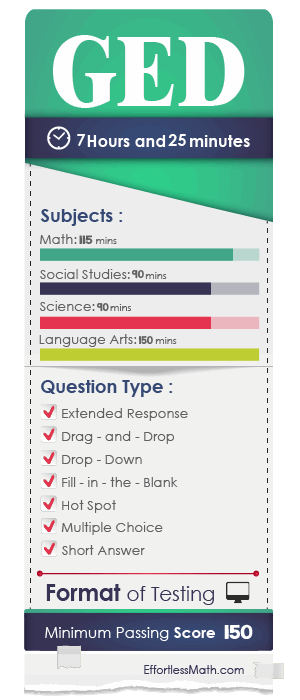
The Absolute Best Book to Ace the GED Math Test
D test and you need a good GED Math prep book, then GED Math for Beginners: The Ultimate Step by Step Guide to Preparing for the GED Math Test is a perfect and comprehensive prep book for you to learn GED Math concepts right from scratch. It will help you brush up your math skills, boost your confidence, and do your best to succeed on the GED Math Test.
This one is an alternative book:
If you just need a GED Math workbook to review the concepts and measure your exam readiness, then try: “GED Math Practice Workbook: The Most Comprehensive Review for the Math Section of the GED Test”
Or if you think you are good at math and just need some GED Math practice tests, then this book is a perfect GED Math test book for you: “5 GED Math Practice Tests: Extra Practice to Help Achieve an Excellent Score”
Want to take the GED Math test in a few weeks or a few days? Then try: “GED Math in 10 DaysThe Most Effective GED Math Crash Course”. This quick study guide contains only the most vital math concepts a GED Math test taker will need to succeed on the GED Math test.
You can also use our FREE GED Math course: The Ultimate GED Math Course.
Have a look at our FREE GED Math Worksheets to assess your knowledge of Mathematics, find your weak areas, and learn from your mistakes.
This product is a perfect resource for everything a GED Math test taker will ever need to ace the GED Math test.
Best GED Math Prep Resource
GED Math FREE Resources:
- The Ultimate GED Math Course
- GED Math Worksheets
- GED Math Formulas
- Full-Length GED Math Practice Test
- FREE GED Math Practice Test
- Top 10 Free Websites for GED Math Preparation
2. Think of math positively
As long as you think about math
negatively, you won’t be able to learn anything. You might go through the
questions quickly to get yourself free from this burden, but during the test,
you wouldn’t remember anything. So, think about it as an easy and fun subject
so you can understand it.
3. Make the concepts clear
First, review and learn the GED Math basic topics and concepts such as fractions, mixed numbers, percent, ratios, proportions, etc. When you feel you understand the basics, then you can review more advanced math concepts such as polynomials, a system of equations, Quadratics, etc. Before solving algebra problems, you need to review the concept of basic pre-algebra. Otherwise, you will have a hard time understanding the higher-level math concepts. You cannot just jump to higher-level math without understanding the basics. You have to go through each level of math and understand the previous concepts.
4. Practice daily
Now, this is important. Even though
you are a genius, you need to practice daily. This will help you improve a lot
and even learn and memorize topics easily. When it comes to math learning, constant
practicing is the key to success.
5. Choose online classes and tutor if you need
Some GED Math test takers prefer to go to classes or work with tutors to accelerate their learning process and prepare for the GED Math test faster. There is several online class and tuitions available for the GED test that can help you learn some important tips and guidelines from professionals. You may need to take some classes every week. They tell you important questions with solutions and also guide you on how to give the test.
6. Use the GED Math Formula sheet wisely
The GED® Mathematical Reasoning test contains a formula sheet, which displays formulas relating to geometric measurement and certain algebra concepts. Formulas are provided to test-takers so that they may focus on the application, rather than the memorization, of formulas. However, the test does not provide a list of all the basic formulas that will be required to know for the test. This means that you will need to be able to recall many math formulas on the GED.
Use that formula sheet whenever you need to solve related math questions. It is a good idea to memorize the most important Math formula on the GED Math, so you will be able to apply them to questions easily and get quick answers.
Here you will find a GED Test Mathematics Formula Sheet and a list of all Math formulas you MUST have learned before test day, as well as some explanations for how to use them and what they mean. Keep this list around for a quick reminder when you forget one of the formulas. Review them all, then take a look at the math topics to begin applying them!
7. Take Practice Tests
When you feel that you are ready to measure your math skills and exam readiness, it is time to experience a simulated GED Math test. You can take an online or written practice test (they are included in many test prep books). You can use our FREE to help you get accustomed to taking the real GED Math exam.
After you are done preparing for the test, take a blind test of yourself, and set a time for yourself. This will not only increase your solving speed but also help you to manage your time. Managing time is another important step. Many GED Math test takers fail because of lacking time management skills. So test yourself several times before your GED Math exam.
GED Math Practice tests will not only help you assess your knowledge and skills, but they’ll also help you get accustomed to taking the exam. That way, when test day comes around you won’t be so stressed.
8. Register online
When you feel that you are ready to take the GED Math test official GED website, create your account, provide the personal information needed, select the subject test you want to take, choose a testing center, pick a day and time that is available, pay the fee, and register for the exam.
9. Take the GED Math test
On the test day, arrive at your testing facility at least 30 minutes before testing for check-in. You need to bring a TI-30XS Multiview Scientific Calculator and your valid forms of identification such as passport, driver’s license/learner’s permit, or state identification.
To take the test, you will place it on a computer. Remember that during the test, you cannot eat, drink, or smoke. Also, you won’t be able to use your cell phone during the test. Put your belongings such as cell phones, handbags, wallets, and keys in the storage space provided for you. All personal items (exempt calculator) must be out of the exam room.
The GED Mathematical Reasoning test is a 115-minute, single-section test. Therefore, you have to be constantly aware of the time but do not worry about the time. The testing software contains a test-timer in the upper right-hand corner of the screen. Again, keep in mind that being worried about the time may ruin your focus.
Leave no question unanswered, because there is no penalty for wrong answers. If you don’t know how to solve a question, simply guess and write the number of the question down. If you had time at the end of the test, you can return to the questions you guessed and review them again. NEVER leave any question unanswered.
Everything You Will Ever Need to Succeed on the GED Math Test
10. Check your score reports
Your GED Test scores will be available within 24 hours of testing. You will get an email informing you of when your test score has been added to your account. Log in to GED.com to see your scores under the My Scores section.
If you have passed the GED, congratulations! You have done a great job! Passing the GED test means you have the level of knowledge that’s expected from a high school graduate.
If you failed the GED math test, it is ok! You can take the test again. If you need to sit for a retake, you must follow your state’s retake policy and re-register for your exam.
11. Interpret your score
Each GED area test is scored on a scale of 100 – 200 points. To pass the GED, you must earn at least 145 on each of the four subject tests, for a total of at least 580 points (out of a possible 800).
Each subject test should be passed individually. It means that you must get 145 on each section of the test. If you failed one subject test but did well enough on another to get a total score of 580, that’s still not a passing score.
There are four possible scores that you can receive on the GED Test:
Not Passing: This indicates that your score is lower than 145 on any of the four tests. If you do not pass, you can reschedule up to two times a year to retake any or all subjects of the GED test.
Passing Score/High School Equivalency: This score indicates that your score is between 145-164. Remember that points on one subject of the test do not carry over to the other subjects.
College Ready: This indicates that your score is between 165-175, demonstrating career and college readiness. A College Ready score shows that you may not need placement testing or remediation before beginning a college degree program.
College Ready + Credit: This indicates that your score is 175 or higher. This shows that you’ve already mastered some skills that would be taught in college courses. Depending on a school’s policy, this can translate to some college credits–saving you time and money during your college education.
There are approximately 46 questions on GED Mathematical Reasoning. Similar to other subject areas, you will need a minimum score of 145 to pass the Mathematical Reasoning Test. There are 49 raw score points on the GED math test. The raw points correspond with correct answers. Most questions have one answer; therefore, they only have one point. There is more than one point for questions that have more than one answer. You’ll get a raw score out of the 49 possible points. This will then be converted into your scaled score out of 200. Approximately, you need to get 32 out of 49 raw scores to pass the Mathematical Reasoning section.
Use the following table to convert GED Mathematical Reasoning raw score to a scaled score.
| GED Mathematical Reasoning raw score to scaled score | |
| Raw Scores |
Scaled Scores |
| below 32 (not passing) | below 145 |
| 32 – 36 | 145 – 164 |
| 37 – 40 | 165 – 175 |
| Above 40 | Above 175 |
The Best Quick Study Guide for the GED Math Test
GED FAQs:
Some common questions about the GED test:
Who can take the GED test?
To take the GED test, you must be at least 16 years old and not currently enrolled in high school. Before registering for the GED test, be sure to check your state’s policies of how long you must have been out of high school to be eligible to take the GED test.
Is a GED equivalent to a grade 12?
Yes! Almost all colleges and employers consider a GED equivalent to a high school diploma.
How to register for the GED test?
Once you’re ready to take the GED test, you need to schedule your test online and take the test at an official GED® test center.
To schedule your GED test:
- Simply create and log into your GED® account.
- Choose the GED subjects you’ll be taking.
- Select a day and time at an official GED® test center near you.
- Pay for the test online using a credit or debit card.
How much does GED
cost?
Different states charge different fees for taking the GED test. In most states, the total cost for all GED subtests ranges between $80-$150. Each section of the GED test costs $30 to $40.
How long is the GED Math Test?
The GED Mathematical Reasoning test is a 115-minute, single-section test.
Do GED test scores expire?
When you receive your GED (General Educational Development) passing score, after all, five test sections of a GED diploma are completed, like a high school diploma, the GED does not expire. However, individual section scores do expire when a new GED scoring system is adopted to meet the new national requirements. For example, if you passed some sections of the GED test and the old system is expired, then you must retake all sections of the GED.
Can I go to college with a GED?
Yes, of course! More than 97% of colleges accept GED. Over 60% of GED recipients got a college degree.
Can you go to college at 16 with a GED?
Yes! But it is a good idea to contact the colleges you’re looking at to find out what other requirements they have for admission.
Does Harvard accept GED?
The short answer is yes. Almost all universities and colleges accept a GED as fulfilling the high school diploma requirements. However, Harvard (and any other top colleges and universities) has an academic readiness requirement that is way beyond the GED. You should check their requirements before applying to a college.
Is GED considered secondary education?
In the US, elementary and secondary education is 12 years. After completing high school (secondary school), students are awarded a high school diploma and it is the minimum requirement for admission to colleges. On the other hand, people who pass the GED exam are awarded a Certificate of High School Equivalency. This Certificate is equivalent to a high school diploma in the U.S.
Can you get your GED online at home?
No! the official GED® test cannot be taken online. You must take the GED test at an official GED® test center.
What is the best GED Math preparation book?
If you need a comprehensive review of everything on the GED Math right from scratch, try this book:
GED Math for Beginners: The Ultimate Step by Step Guide to Preparing for the GED Math Test is a perfect and comprehensive prep book for you to learn GED Math concepts right from scratch. It will help you brush up your math skills, boost your confidence, and do your best to succeed on the GED Math Test.
If you think you are good at math and only want to take some practice tests, then this book is for you: “5 GED Math Practice Tests: Extra Practice to Help Achieve an Excellent Score”
What is the best GED online program?
This online GED math test prep course is the best training you need!
The Ultimate GED Math Course
What is the best GED Math mobile application?
GED Math Test & Practice 2019 offers a complete review of all GED Mathematics concepts that you will need to know before the test day. It also provides two full-length GED Math Practice Tests that reflect the format and question types on the GED test.
Find the app for Android devices here and iPhones (IOS devices) here.
Is the GED Math test all multiple choice?
No! Multiple-choice, fill-in-the-blank, and drag and drop questions are different types of questions that you will see on a real GED Math test.
Where can I find a FREE GED Math practice test?
You can download our FREE GED Mathematical Reasoning Practice Test, and take the test to measure your exam readiness, learn from your mistakes, and prepare for the real GED Mathematical Reasoning Test!
How long should you study for the GED Math Test?
It depends on your mathematics background. It can take one or two months to pass the GED Math test if you study 4-5 times a week for at least 1 hour.
Can I retake the GED if I passed?
If you passed the GED but you are unhappy with the score you’ve received, you cannot simply register for the test again. Most states have very strict GED retake policies, and not everyone qualifies. Most states exempt you from this rule if, and only if, a college or employer requires you to retake the exam.
Should homeschoolers take the GED?
Most homeschoolers prefer a homeschool diploma over a GED. A GED certificate shows that the student has accomplished the minimum amount of work required to graduate. Therefore, four-year colleges may not be impressed by the GED certificate. A homeschool diploma might be a better option for most homeschoolers who want to continue their studies.
Can I use a calculator on the GED test?
You can use your calculator during the Social Studies test, the Science test, and the second Section of the Mathematical Reasoning test.
How many questions are on the GED test?
The GED mathematical reasoning test consists of 46 questions. There are two parts to the Mathematical Reasoning section. The first part contains 5 questions where calculators are not permitted. The second part contains 41 test questions. Calculators are allowed in the second part.
What is the passing score for GED Math?
Each GED area test is scored on a scale of 100 – 200 points. To pass the GED, you must earn at least 145 on each of the four subject tests, for a total of at least 580 points (out of a possible 800).
How many questions can you get wrong on the math GED test?
There are 46 mathematics questions on the GED Mathematical Reasoning test. To pass the GED Mathematical Reasoning test, approximately you need to get 60-65% of the available points on the test or 32 raw points to pass, so you can miss 17 points and still pass the test.
How many times can I retake the GED Math test?
While each state has its policies about retesting, in general, you can take each subject test three times per year. If you passed any of the subjects, you do not need to retake that portion of the test. That means you can focus on improving in the subjects where you did poorly. Be warned, though, that scores taken after January 2014, with the new GED test, cannot be combined with scores taken before that date.
Still, have some questions about preparing for the GED Math test? Leave your comment below.
High School Equivalency Tests
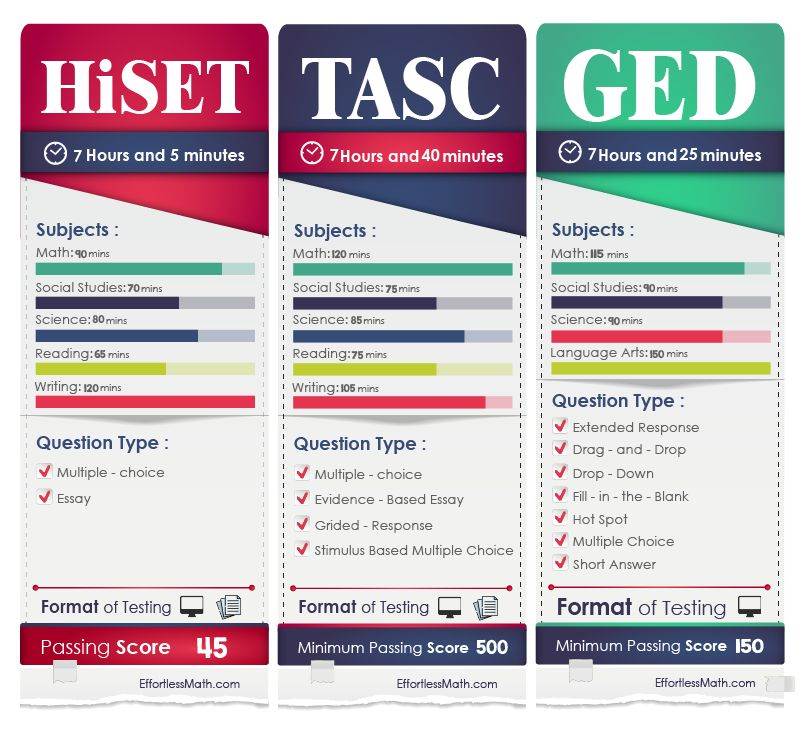
The Best Books to Ace the GED Math Test
More from Effortless Math for GED Test …
Now that you’ve stuck your toe in the waters of GED test, are you ready for more?
Of course, you are! Check out our Ultimate GED Math Course. This course is the only resource you will ever need to ace your GED Math test! It contains lessons, videos, worksheets, practice tests, and GED Math Test-Taking Strategies to help you prepare for your GED Math test.
The best way to study for the GED Math test is to use realistic GED math practice questions.
Try our Full-Length GED Math Practice Test and Free GED Math Practice Test to measure your exam readiness.
The Perfect Prep Books for the GED Math Test
Have any questions about the GED Test?
Write your questions about the GED or any other topics below and we’ll reply!
Related to This Article
More math articles
- How to Understand the Real Number Line
- Discovering the Magic of SSS and SAS Congruence in Triangles
- A Comprehensive Collection of Free TASC Math Practice Tests
- Full-Length AFOQT Math Practice Test-Answers and Explanations
- Debating Tailoring Your Study Plans To Suit Your Learning Styles? Here’s Why You Should
- How to Solve Radical Inequalities?
- Full-Length 6th Grade Common Core Math Practice Test
- 6th Grade MAAP Math Worksheets: FREE & Printable
- The Math Behind Slots: Understanding Probability and Payouts
- Top 10 SAT Math Practice Questions
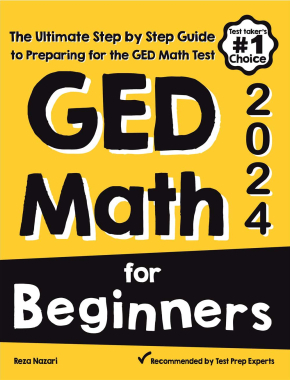
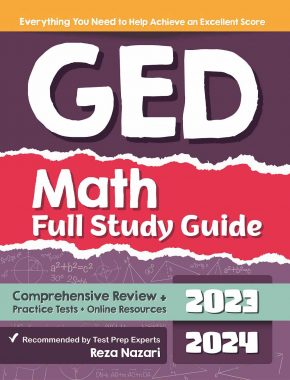
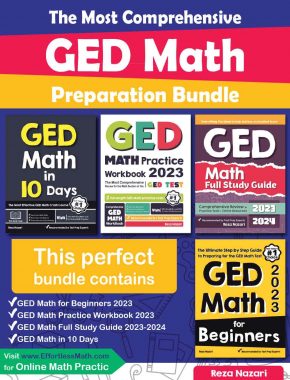
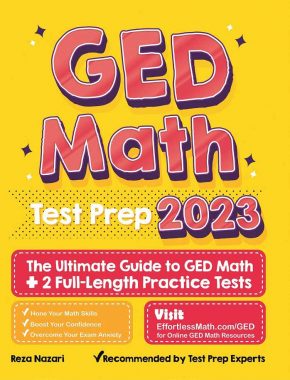
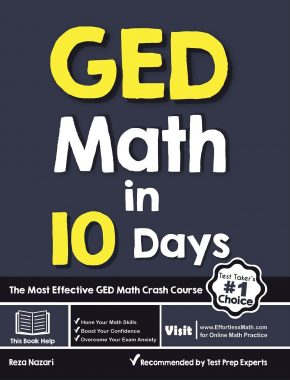

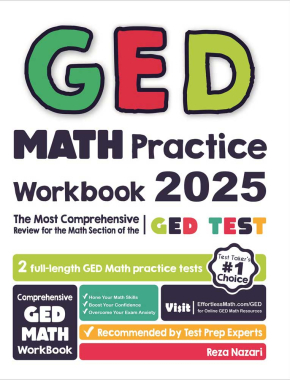
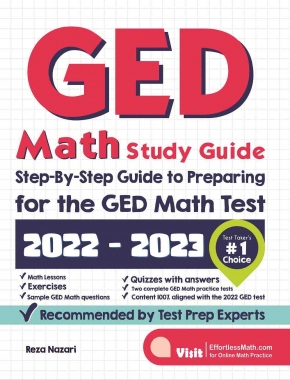


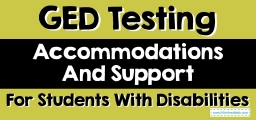
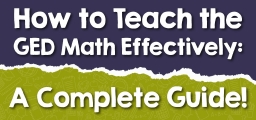



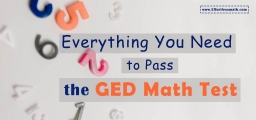


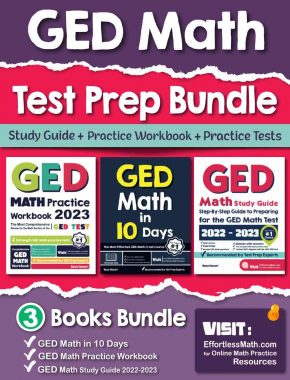
What people say about "GED Math Study guide: 11 Steps to pass the GED Test in 2026! - Effortless Math: We Help Students Learn to LOVE Mathematics"?
No one replied yet.